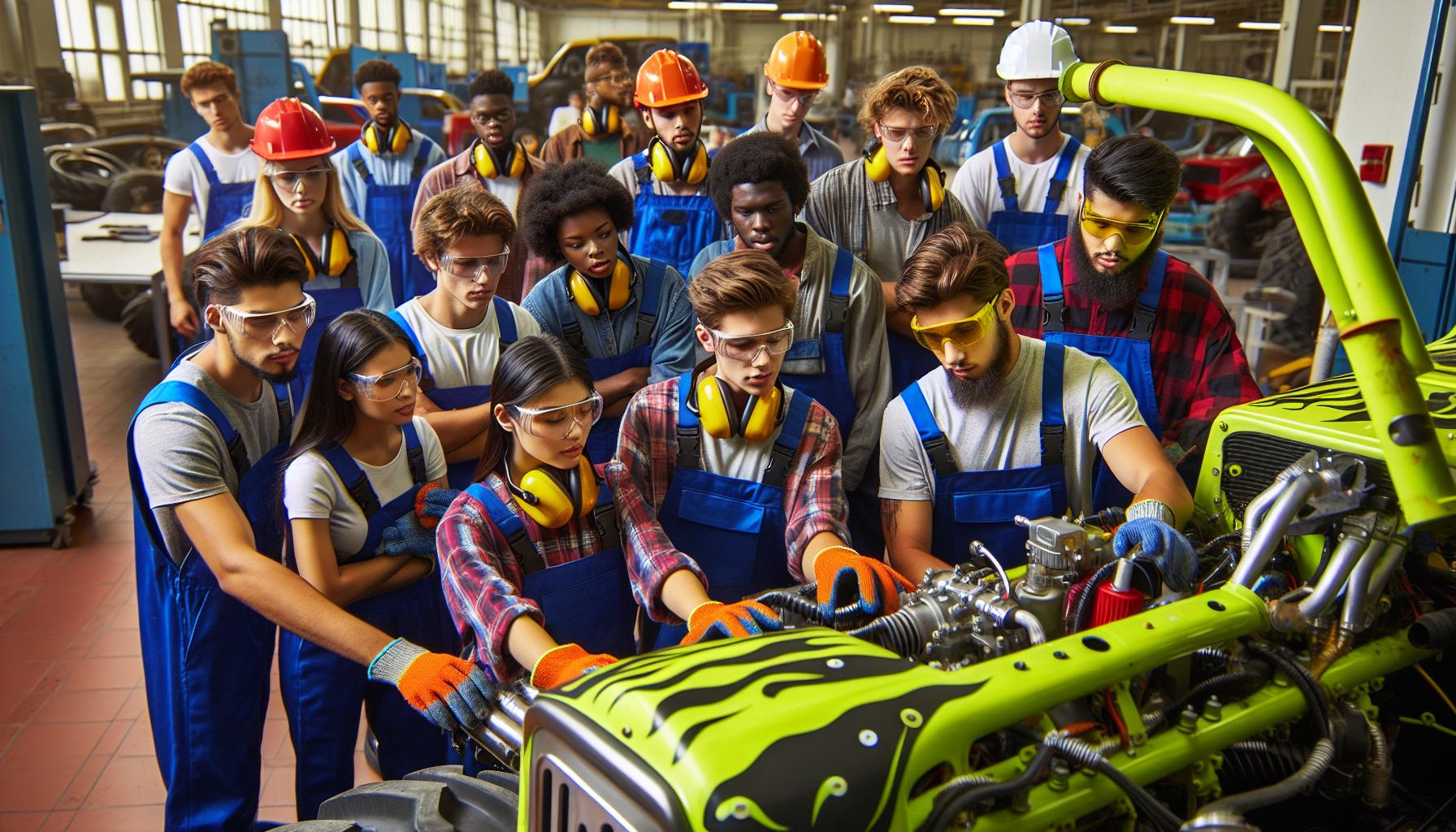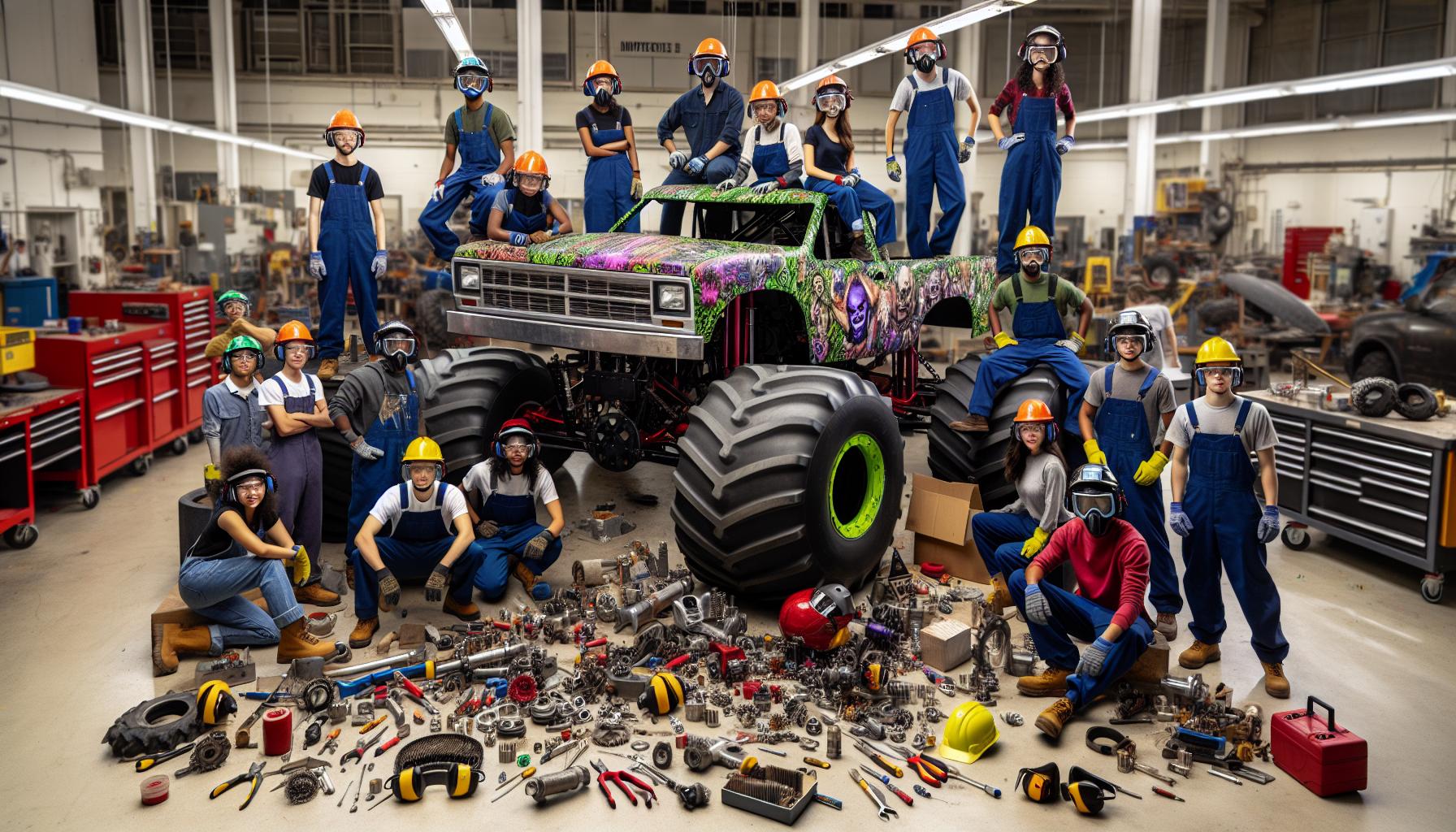Who says higher education can’t be a wild ride? Monster truck programs are revving up across universities offering a unique blend of engineering prowess and adrenaline-pumping excitement. Students are trading traditional textbooks for torque wrenches and classroom lectures for hands-on experience in the pit.
These specialized programs combine mechanical engineering fundamentals with real-world monster truck design and operation. From chassis fabrication to engine modifications students learn the intricate balance of power performance and safety. It’s where academia meets automotive mayhem in the best possible way. Some of the nation’s top technical schools now offer specialized courses certifications and even degrees focused on the monster truck industry creating a new generation of educated gear heads ready to shake up the motorsports world.
The Rise of Monster Truck Programs in Higher Education
Academic institutions across the United States have integrated monster truck education into their engineering curricula since 2018. Texas A&M University launched the first accredited monster truck engineering program, followed by 5 other major universities in the subsequent years.
Monster truck programs combine traditional mechanical engineering courses with specialized training modules:
- Advanced suspension dynamics focusing on monster truck-specific requirements
- Custom chassis design utilizing CAD software
- High-performance engine modification techniques
- Safety systems engineering for extreme motorsports
- Event management strategies for monster truck competitions
The enrollment numbers demonstrate significant growth:
| Year | Number of Programs | Total Enrolled Students |
|---|---|---|
| 2018 | 1 | 24 |
| 2019 | 3 | 87 |
| 2020 | 4 | 156 |
| 2021 | 6 | 245 |
Industry partnerships enhance these educational programs through:
- Direct collaboration with Monster Jam technical teams
- Access to professional-grade equipment from racing manufacturers
- Internship opportunities with leading monster truck builders
- Guest lectures from veteran monster truck drivers
- Sponsorship support for student-built vehicles
Research initiatives within these programs focus on:
- Alternative fuel systems for monster trucks
- Lightweight materials development
- Advanced tire compound formulation
- Impact absorption technology
- Digital telemetry systems
- Monster truck design engineers
- Performance testing specialists
- Safety systems developers
- Competition technical directors
- Motorsport event coordinators
Top Universities Offering Monster Truck Studies

Leading academic institutions across the United States provide comprehensive monster truck education programs through specialized degrees and professional certifications. These programs combine technical expertise with hands-on experience in monster truck design and operations.
Specialized Degree Programs
Texas A&M University offers a Bachelor of Science in Mechanical Engineering with a Monster Truck Systems concentration, featuring courses in advanced suspension dynamics and powertrain engineering. Michigan Technological University’s Motorsport Engineering program includes a dedicated monster truck track with specialized courses in chassis design and safety systems. The University of Northwestern Ohio delivers a unique Monster Truck Technology major, incorporating courses in fabrication techniques and event management.
| University | Program Type | Key Specializations |
|---|---|---|
| Texas A&M | BS Mechanical Engineering | Suspension Dynamics, Powertrain |
| Michigan Tech | BS Motorsport Engineering | Chassis Design, Safety Systems |
| UNOH | BS Monster Truck Technology | Fabrication, Event Management |
Certificate Courses and Training
Professional certification programs provide focused training in specific monster truck disciplines. The Universal Technical Institute offers a 12-week Monster Truck Systems Specialist certification, covering hydraulic systems and custom fabrication. Penn College of Technology provides a 16-week Advanced Monster Truck Operations certificate, focusing on safety protocols and performance optimization. These programs maintain direct partnerships with Monster Jam and major equipment manufacturers, offering students access to industry-standard tools and technology.
| Certificate Program | Duration | Focus Areas |
|---|---|---|
| UTI Specialist | 12 weeks | Hydraulics, Fabrication |
| Penn College | 16 weeks | Safety, Performance |
Career Opportunities in Monster Truck Education
Monster truck education programs create diverse career pathways for professionals in both academic and industry settings. The field combines technical expertise with practical application, offering specialized roles across multiple sectors.
Teaching and Instruction Roles
Educational positions span classroom instruction to hands-on training facilities. Program directors at institutions like Texas A&M University earn $85,000-$115,000 annually leading monster truck engineering departments. Technical instructors specialize in areas such as chassis design, engine systems or safety protocols with salaries ranging $65,000-$90,000. Laboratory coordinators manage specialized training facilities, maintaining equipment and supervising student projects. Industry practitioners transition into adjunct faculty positions, bringing real-world expertise to university programs through guest lectures or workshop instruction.
Research and Development Positions
R&D teams drive innovation in monster truck technology across universities and manufacturers. Research engineers focus on alternative propulsion systems, composite materials or advanced suspension dynamics with compensation packages between $75,000-$125,000. Testing specialists conduct performance analysis using specialized equipment and data acquisition systems. Technical consultants develop new safety standards and competition regulations through partnerships with sanctioning bodies. Laboratory directors oversee research facilities equipped with simulation technology, dynamometers and fabrication equipment while managing budgets exceeding $2 million annually.
| Position Type | Salary Range | Required Experience |
|---|---|---|
| Program Director | $85K-$115K | 8+ years |
| Technical Instructor | $65K-$90K | 5+ years |
| R&D Engineer | $75K-$125K | 3-7 years |
| Lab Director | $90K-$130K | 10+ years |
Impact on Traditional Automotive Education
Monster truck education programs reshape conventional automotive curricula through specialized training modules integrated into existing mechanical engineering frameworks. Traditional automotive programs now incorporate advanced suspension dynamics alongside standard vehicle maintenance courses. Engineering departments adapt their facilities to accommodate monster truck-specific equipment including custom chassis testing stations simulation rigs.
Faculty members cross-train between traditional automotive subjects monster truck specializations creating a more diverse educational environment. Automotive laboratories upgrade their equipment to handle both standard vehicles monster truck components with dual-purpose testing facilities. Computer-aided design courses expand to include monster truck-specific modeling software meeting industry demands.
The integration affects resource allocation in automotive departments:
- Equipment upgrades cost $250,000 to $750,000 per institution
- Laboratory space requirements increase by 35% on average
- Student-to-instructor ratios adjust from 20:1 to 15:1
- Technical material budgets expand by 45%
Traditional automotive programs experience these enrollment shifts:
| Program Type | 2018 Enrollment | 2021 Enrollment | Change |
|---|---|---|---|
| Standard Auto | 1,200 | 950 | -21% |
| Monster Truck | 24 | 245 | +920% |
| Hybrid Programs | 0 | 180 | New |
Certifying bodies modify their accreditation standards to include monster truck engineering competencies. Industry partnerships expand beyond conventional automotive manufacturers to include specialized monster truck equipment producers. Career services departments develop new placement tracks combining traditional automotive monster truck industry opportunities.
- Dual certification pathways in automotive monster truck systems
- Combined internship programs with major manufacturers
- Cross-disciplinary research projects
- Shared laboratory resources
- Integrated safety certification requirements
Industry Partnerships and Collaborations
Leading monster truck manufacturers partner with higher education institutions to provide specialized equipment resources. Monster Jam University contributes professional-grade chassis components valued at $2.8 million across six participating schools. Advanced Performance Engineering supplies custom powertrains through its Academic Alliance Program to support hands-on learning experiences.
Key industry collaborations include:
- SEMA partnering with Texas A&M to develop standardized safety protocols
- BKT Tires providing advanced compound testing facilities at Michigan Tech
- Fox Racing Shox establishing research centers for suspension dynamics
- Dennis Anderson Legacy Program offering mentorship connections
| Partner Type | Investment Value | Number of Schools |
|---|---|---|
| Manufacturers | $4.2M annually | 6 institutions |
| Parts Suppliers | $1.8M annually | 12 institutions |
| Event Promoters | $950K annually | 8 institutions |
Corporate sponsorships extend beyond equipment donations into research funding. RAM Trucks funds $750,000 in annual research grants focusing on drivetrain innovation. Polaris Industries maintains dedicated engineering labs at three universities specializing in chassis design optimization.
Technical exchange programs connect students with industry professionals:
- Quarterly workshops led by Monster Jam technical directors
- Summer internship placements at major fabrication facilities
- Guest lecture series featuring veteran drivers
- Collaborative design projects with racing teams
These partnerships create direct pathways from education to employment opportunities in the monster truck industry while providing essential resources for program development.
Conclusion
Higher education monster truck programs represent a transformative shift in automotive engineering education. The explosive growth in enrollment numbers combined with strong industry partnerships demonstrates the field’s promising future. Students graduating from these programs are well-positioned to drive innovation and shape the future of motorsports.
These specialized programs have created new career pathways while fostering technological advancement in the monster truck industry. As universities continue to expand their offerings and adapt their facilities the integration of monster truck education into traditional automotive curricula will likely accelerate preparing the next generation of motorsport professionals for success.

